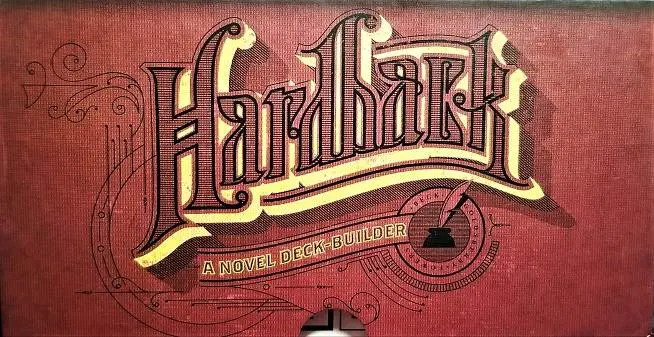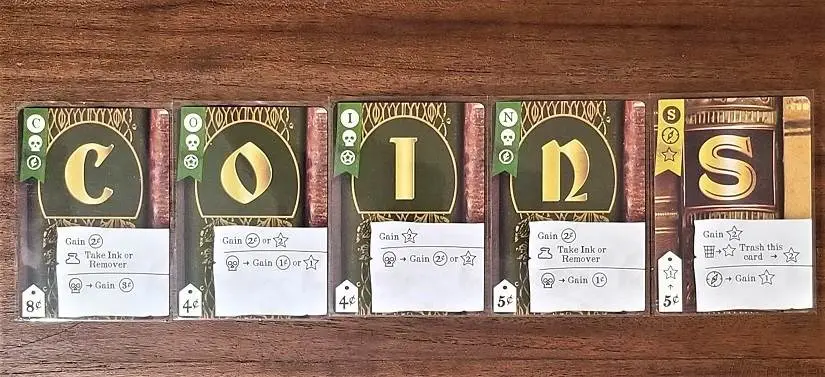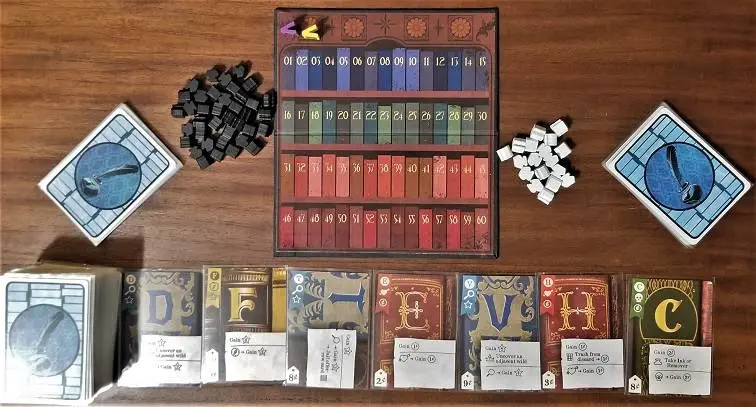
The ink is fresh, the quill is sharp, and it’s time to put all of those ideas floating around in your head on paper. In Hardback from Fowers Games, players take on the role of impassioned novelists during the 1800s striving to make a name for themselves and make a living by penning books. Books don’t write themselves, however, so gather around the table with your fellow novelists to compete to become the most prestigious author in this 1-5 player card game.
Though Hardback is technically a sequel to the 2014 release Paperback, the nineteenth-century setting and storyline make it into a prequel. Hardback made its appearance on Kickstarter in 2017 and was fully funded in less than an hour after the launch of the crowdfunding campaign. The game was designed by Jeff Beck and Tim Fowers. In addition to working on Hardback, Beck is known for designing Getaway Driver, Intrepid, and Word Domination. Fowers made his debut with Wok Star in 2010 before moving on to other projects such as Paperback, Burgle Bros, and the upcoming solo game: Paperback Adventures. Designer Tim Fowers and artist Ryan Goldsberry have worked together on many of the projects from Fowers Games. Goldsberry’s illustrations are easily recognizable by their vintage nostalgia vibe mixed with his use of a colorful palette. In the case of Hardback, Goldsberry’s work does an excellent job of bringing the humorous parodies of popular nineteenth-century titles such as A Journey to the Centre of the Earth – or, in this case, Centre of the Earl – to life.
As with most deck-building games, players will receive their starting deck consisting of cards that provide a blend of purchasing power and a second resource; in this case, Prestige points. What makes the starting decks in Hardback different, however, is that not all decks are completely the same. While the starting cards used for their purchase power are identical for all players, the players will also draw two random Prestige cards to begin their collection. All unused starter cards are returned to the box including unused Prestige cards. Furthermore, players will receive a colored player token and a matching player card. All player tokens are placed on the Prestige Tracker in the middle of the play area. Ink and Remover tokens are placed nearby. The Adventure, Horror, Romance, and Mystery letter cards are all shuffled into one large deck and placed face down near the Prestige Tracker. From this deck, the top seven cards are drawn and flipped face up to form the Offer Row. Players will then shuffle their starter decks and draw their first hand of five cards. The player who most recently used a pen is chosen to be the first player with play proceeding clockwise.

Traditionally, writers were often paid by the word, and Hardback references that premise for gameplay. On a player’s turn, they will create words using the letters in their hand to earn both prestige and money as well as try to trigger any abilities listed on the cards. If a player is missing a certain letter, then one or more cards may be placed face down as a wild to complete the word but will earn neither resource. Any unused cards are discarded before resolving card benefits. Prestige points are scored immediately and then any purchasing power may be spent to buy cards from the Offer Row and Ink from the supply. Some cards have genre-based benefits as well as their basic benefits, so buying cards that can combo off of one another is an excellent strategy. It is important to remember that unspent coins disappear at the end of the turn so players will want to try to use as many of them as they can. In addition to being able to combo cards off of one another, each genre offers its own theme for play style. For example, Horror cards tend to offer the user the choice of playing a letter for either coins or Prestige as well as being the only way to earn Remover tokens. Once purchases are complete, the player will draw a new hand of five cards and play will pass to the left. Hardback also has an element of push-your-luck that we do not often see in deck-builder games. Buying Ink will allow you to later spend it as stored coin, but more useful is that you can spend these tokens to draw extra cards from your deck into your play area. Doing so will mean that you put them face up in front of you and that you must use those letters in the word that you next play. All hope is not lost if you draw a letter that would otherwise jam you up, however, because you can also spend Remover tokens if you have any to take those cards into your hand and play them normally. Those horizontal letters found in the box? They’re called Timeless Classics and can be used more than once when forming words! Once played, the card remains in front of the player until someone else at the table uses it to form a word. These cards provide recurring basic and genre benefits whether they are used or not by the player. Players take turns in this fashion until someone reaches 60 Prestige thus triggering the final round of the game. In the end, the player with the most points wins.
Deck-builders are often very similar and can end up feeling the same. To keep Hardback fresh, there are multiple variants included in the box. Literary awards, player powers, events, and even a co-op mode where players work together to out-write Penny Dreadful can keep players coming back for more. Each of these variants comes with its own rules, setup, and extra components, yet all fit easily within the box. With so many variations Hardback does a wonderful job of keeping itself fresh with its mechanics and gameplay meaning it will take quite some time before it even starts to feel old. The game is quick to teach and plays well at all player counts. It is both simple and challenging so that it can appeal to multiple types of game and book enthusiasts. Hardback really does have a lot going for it with so much in the box and no need for buying additional content that we were very happy to have managed to find a copy at a swap meet at our local FLGS and will have it on our list of games to play with friends both old and new for quite some time to come.
All photos of Fowers Games products were taken and edited by Krista.
